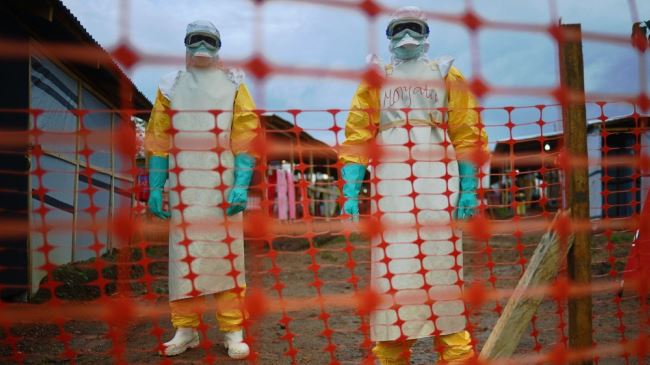 Photo shows M�decins Sans Fronti�res (MSF) medical workers wearing protective clothing work at the MSF facility in Kailahun, Sierra Leone, on August 14, 2014.[/caption]
Photo shows M�decins Sans Fronti�res (MSF) medical workers wearing protective clothing work at the MSF facility in Kailahun, Sierra Leone, on August 14, 2014.[/caption]Geneva, August 23, IRNA -- As Liberia continues to struggle with the largest and most complex outbreak of Ebola in history, the World Health Organization is working with the UN, the government and other partners to intensify the Ebola response by injecting new assets into Liberia�s health sector and beyond.
The announcement comes following the UN high level delegation�s meetings with government officials, NGOs and other partners to review and fill the gaps in the ongoing Ebola response.
�Ebola in Liberia must be addressed to ensure a stable economy, future and society,� says Karin Landgren, the Special Representative to the UN Secretary-General.
�The magnitude of this outbreak requires a higher level of coordination than previous responses and the UN Mission in Liberia will play a strong role in this effort.�
The outbreak in Liberia continues to expand. As of 22 August, there have been 1,082 cases and 624 deaths reported. Ebola virus disease is putting strains on society and areas outside the disease itself. Systems for common and sometimes serious health conditions are not functioning as they should. Increasingly, mothers and children cannot access the care they need.
�This extraordinary outbreak requires an unprecedented response in all dimensions,� says Dr David Nabarro, the UN Secretary-General�s Coordinator for the Ebola response working in close collaboration with WHO.
�The new coordinating platform that engages government, partners and the UN will bring a new level of accountability, and integrate effective action so we can ensure the right resources get to the areas they are needed most.�
Stepping up the health aspects of the outbreak are the key to stopping it.
First, identifying those who are sick early, caring for them in health facilities and protecting others so this disease does not spread to any more people. But the number of patient beds available in care centres in Monrovia are insufficient for the numbers of patients expected.
�We have seen some of the available current care centres in Monrovia that have been set up by the Ministry of Health and Social Welfare, Medecins Sans Frontier and other partners, and we recognize containing this outbreak will require many more areas like this,� says Dr Keiji Fukuda, Assistant Director-General for WHO and one of the leaders of the UN high-level delegation in Monrovia this week.
�Therefore, today, WHO is committing to step up its work with partners to build additional care facilities around Monrovia to expand the number of Ebola care beds by as many as 500 in the next 6 weeks.�
Although Ebola has a high fatality rate, experience has shown that even without new medicines, proper treatment of persons increases chance of survival.
In addition, if it continues unabated, the Ebola outbreak could pose an additional risk to other health issues.
Some health clinics have closed and resources have been shifted to the Ebola response.
The UN delegation will continue to work with the government and other UN partners in the coming days to finalize the development of the coordinating platform and solidify the details of the additional assets needed to fill the gaps in the Ebola response plan.
By IRNA
The Iran Project is not responsible for the content of quoted articles.










